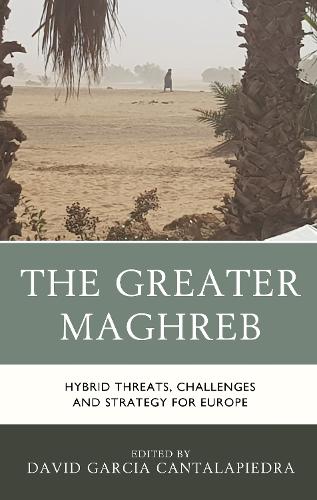
The Greater Maghreb: Hybrid Threats, Challenges and Strategy for Europe
(Hardback)
Publishing Details
The Greater Maghreb: Hybrid Threats, Challenges and Strategy for Europe
By (Author) David Garcia Cantalapiedra
Contributions by Aurora Ganz
Contributions by Carolina Sampo
Contributions by Gustavo Diaz
Contributions by Julia Pulido
Contributions by Nieva Machn Oss
Contributions by Raquel Barras Tejudo
Contributions by Ruben Herrero de Castro
Contributions by Soledad Segoviano
Bloomsbury Publishing PLC
Lexington Books
18th September 2019
United States
Classifications
Professional and Scholarly
Non Fiction
961.05
Physical Properties
Hardback
160
Width 161mm, Height 228mm, Spine 16mm
422g
Description
This book represents a different approach in the study of the Sahel region in North Africa. Due to the hybrid security threats sweeping across the area, the whole region becomes a new security complex different from Middle East and more related to Western and Central Africa developments, including the impact of drug-trafficking coming from Latin America. This book discusses how the Transnational Organized Crime-Terrorism Nexus has created a very different dynamics from Middle Easts, hitting hard to people, societies and states there. The contributors argue that the countries in the area and the European Union should recognize this new complex and respond properly and differently to this situation.
Reviews
Drug trafficking, terrorism, criminal insurgency, hybrid warfare, refugees, and climate change trouble the Greater Maghreb, the area stretching across North Africa and the Sahel. David Garcia Cantalapiedra and a group of experts explain how these threats interact across Europes southern security flank, challenging the European Union and the states in the region. This outstanding collection of essays explains why the Greater Maghreb might just be ground zero when it comes to todays most pressing security issues. -- James J. Wirtz, U.S. Naval Postgraduate School
The Greater Maghreb: Hybrid Threats, Challenges and Strategy for Europe provides an excellent updated and in-depth analysis of the southern neighborhood of Europe: the Maghreb-Sahel region, where most of the actual dangers, risks, and threats remain concentrated. -- Carlos Echeverra Jess, University Institute General Gutirrez Mellado-UNED
The Greater Maghreb appears to be as much a promising concept for the study of the North Africa and Sahel region as the Mackinder and Spykman inspired concepts of the Greater Middle East and the Greater Central Asia. If these described mainly a theatre of operations for the US, the Greater Maghreb is not a geopolitical and strategic response to other powers, but a useful and self-critical EU approach to the region from where the main threats and challenges to Europe are coming. -- Natividad Fernndez-Sola, Georgetown University
Author Bio
David Garca Cantalapiedra is professor at the Universidad Complutense de Madrid.
